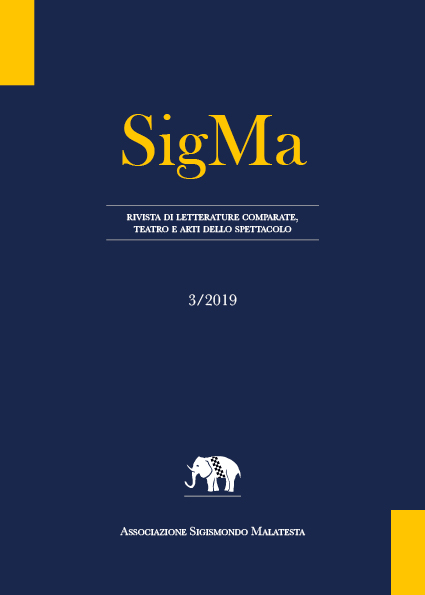Lukács e Auerbach: apocalisse, rinascita e l’universalità del quotidiano
Abstract
Il romanzo è l’“epopea di un’epoca […] nella quale l’immanenza del senso della vita si è fatta problematica, ma che, nondimeno, anela alla totalità”. Così Lukács nella sua giovanile Teoria del romanzo (1916). L’universo perfettamente conchiuso dell’epos antico ha lasciato il posto, nel romanzo, a una realtà frammentata e caotica, sintomo dell’avvenuta scissione tra individuo e mondo.
Lo stesso universo multiforme e stratificato fa da sfondo al romanzo modernista così com’esso è illustrato da Auerbach nell’ultimo capitolo di Mimesis (1946), là dove si osserva che, in mancanza di criteri per ordinare la realtà, gli scrittori del primo Novecento hanno cominciato a dedicare la loro attenzione ai piccoli accadimenti della vita quotidiana, veri condensatori di significato, che ora occupano, nello spazio narrativo, il posto un tempo riservato alle grandi svolte del destino.
Sullo sfondo di uno scenario così disegnato, in cui la dissoluzione della forma romanzesca coincide con il “tramonto del nostro mondo”, emerge tuttavia, in Lukács come in Auerbach, il bagliore fioco di una speranza, di una palingenesi dell’umanità che ripristini la ‘totalità’ perduta dei tempi antichi. Lukács ne intravede i segni nell’opera di Dostoevskij, che prosegue e porta a compimento la linea tracciata da Tolstoj, il quale nella sua opera aveva rappresentato “comunità di uomini che sentono allo stesso modo, semplici e intimamente partecipi del mondo della natura”. Una nuova universalità Auerbach la individua nell’attenzione, quasi sacrale, che gli scrittori modernisti hanno dedicato ai piccoli gesti della quotidianità, dettagli minimi di vite ordinarie che si fanno espressione di una eguaglianza primigenia fra gli uomini.
Il ritorno a una poesia delle cose, che racconti di un rapporto immediato e spontaneo con la natura e dia l’idea di una comunione intima fra tutti gli individui è per i due studiosi un’istanza etica, prima ancora che letteraria.
Downloads
SigMa pubblica in internet, ad accesso aperto, con licenza:
|
|
CCPL Creative Commons Attribuzione |
L'autore conserva il copyright sul suo contributo, consentendo tuttavia a chiunque "di riprodurre, distribuire, comunicare al pubblico, esporre in pubblico, rappresentare, eseguire e recitare l'opera", purché siano correttamente citati l'autore e il titolo della rivista. L’autore, al momento della proposta di pubblicazione, è inoltre tenuto a dichiarare che il contenuto e l’organizzazione dell’opera è originale e non compromette in alcun modo i diritti di terzi, né gli obblighi connessi alla salvaguardia di diritti morali ed economici di altri autori o di altri aventi diritto, sia per testi, immagini, foto, tabelle, sia per altre parti di cui il contributo può essere composto. L’autore dichiara altresì di essere a conoscenza delle sanzioni previste dal codice penale e dalle leggi speciali per l’ipotesi di falsità in atti ed uso di atti falsi, e che pertanto Reti Medievali è esente da qualsiasi responsabilità di qualsivoglia natura, civile, amministrativa o penale, e sarà dall'autore tenuta indenne da qualsiasi richiesta o rivendicazione da parte di terzi.

